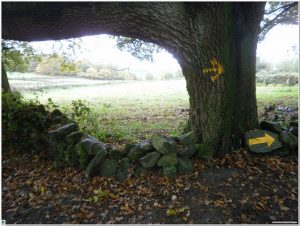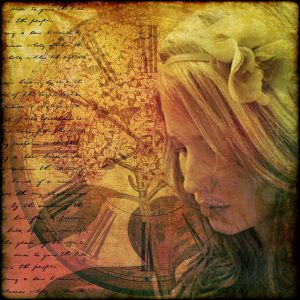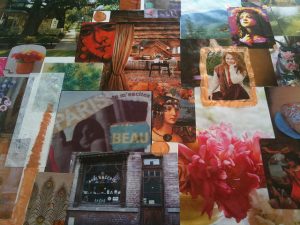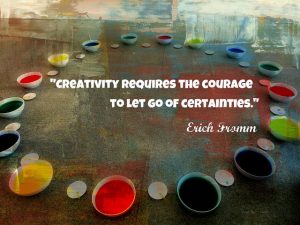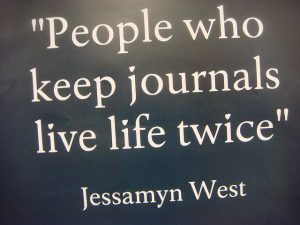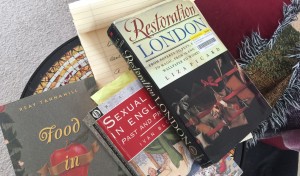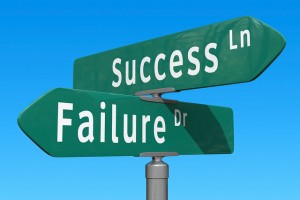Posts by Barbara O'Neal
How do you learn to know your voice? How can you find the connection points in your life and yourself, and know when you’re really connecting to the stories you’re meant to tell?
I teach voice a lot, and I love that moment when a light comes on for a writer, when their eyes show that slight shock, sometimes a distinct discomfort. I love it when I feel it myself, too, that sharp, intense feeling of connection.
Often, I’ve said to you here that I believe you were meant to be a writer. You wouldn’t be pursuing this difficult and challenging work if there were some way you could get out of it. I strongly believe you were meant to tell your own, particular, unique, individual, only-you-can-tell-them stories.
How do you know what those are? How can you see your own voice? One way is to look back at the journey you’ve taken in your writing so far. What are your favorite bits of writing? What are your best? Don’t just look at published or polished work. Take a wander backward and see what you see in your whole body of work.
The best way I can illuminate that path is to share some points in mine.
Even as a small child, I made up story-songs, and spun stories to myself, but the first thing I remember writing that really connected was in the fifth grade. A very short story about an old man dying on his birthday, and his regret over his relationship with his son. It contains a detail about flies, buzzing too lazily in the heat to even move off a ledge, which I took out of my own life, a very uncomfortable sad moment when my dad’s dad came to see us and I was alone in the house. I had no idea what to say to him so I sort of skulked around, peeking at him on the patio. He stood there with his hands in his pockets, tall and white haired, staring out at something in the distance. We were strangers to each other, even though we lived in the same town. Eventually, he left, and I felt both relieved and embarrassed. The story emerged from my discomfort.
That was the first time I really connected to the page.
Read MoreAs I write this, I’m looking out the window at the fluttering yellow leaves of an aspen. Storm clouds are rolling in over the blue mountains. I’m at a retreat, with friends I’ve known for nearly all of my career. It’s a lucky thing, this house, this time. I have a book that absolutely must be finished, and it’s good to have the time.
I’m listening to the new Leonard Cohen album, just released. He’s 82, and his raw, regretful, whispery voice goes directly to the ache in my heart. There’s that thread of melancholy violin, his mystical wonderings, his admission, again and again, that it’s hard to know the truth, but maybe trying is all there is. In his work is the knowledge of impending death mixed with love and beauty and lust and song, whiskey and women and high mountain tops.
He reminds me that one of the greatest things we can bring to our writing is that certainty, lurking always, that we will die. If you find yourself ducking away from that, getting ready to skim, don’t. Stick with this for a minute.
I’m grieving my old dog, who lived a great long life and loved me madly and kept me company for 14 years. Jack was the warm body next to me during some of the saddest days of my life, when I was first divorced and feeling like nothing would ever be okay. He traveled with me up the highway to a new city, hanging out with me as I dated and went on hikes and found my way into a new life.
His death was not unexpected, and it was as clean and good as one would hope for such a loyal companion, but it was the second significant loss of the year. A good friend of mine died last spring. There is more, but you don’t have to hear it all to know my point.
Grief is exhausting. It leaps into your arms and must be carried for as long as it takes to work through it. There’s no getting around the powerful, philosophical, urgent questions it brings with it.
Read MoreWe’d all like to be this popular.
Writers and money have been on the internet this week, notably in an essay by a young woman writer, Merritt Tierce, who published a novel to high acclaim. In the article, she described her despair at being unable to make money as a writer. Plaintively she wrote, “I would, right now, sign in blood a contract that would pay me $40,000 a year for the rest of my life. No advances. No royalties. No freelance checks, no honoraria, no prize money, no film or TV options. At this stage in my vocational life, $40,000 is probably well below my earning capacity.”
The essay irritated me, became a pebble in my shoe. I wanted to just walk away, forget about it, but every time I took a step, there it was, gouging my instep. So why the irritation? I wasn’t sure. I mean, I actually agree with her: it’s damned hard to make an actual living as a writer, even when you’re doing well. Even when you’re award- winning and/or critically acclaimed or get a lot of rights abroad and a bunch of translations or movie deals. The money comes in giant chunks at unreliable intervals at vast distances from each other, or it comes in drips and drabs or not at all.
I get it. The money part of a writing life is not the easy part.
And yet, that pebble in my shoe would not shake out. I poked around the internet to see what I could read about writing and money. I found another essay written by another young woman, Emily Gould, who made a big money deal for her first book, which then failed (8000 copies on a $200,000 advance) and couldn’t sell another. That’s enough money, and a big enough failure, that it really does cause problems for a writer—trouble that will be difficult to overcome.
In contrast, Tierce sold 12000 copies of a hardcover book and was paid a rather modest advance of somewhere between $50-99,000 according to Publishers Marketplace. No way she’d earn out the advance on those numbers, and probably her publisher considers that a failure, too, but they are not as challenging as Gould’s.
Both women talked about selling one book and then struggling to make a go of a career. But Gould’s essay didn’t irritate me in the slightest. She was panicked and poor and doing writing conferences on a shoestring, shamed into buying an admirer’s coffee even though she barely had any cash of her own. Any writer without some other means of support has probably been there. I know I have, many times. But instead of howling about the circumstances, she dove back into the work, trying to write something else, find her voice, live somewhere cheaper than Brooklyn.
Then she zeroes in on this:
“Or maybe the problem—well, a problem—was that I felt entitled to several different lives. In one of these lives, my book has made me famous as a pundit and wit, the kind of person who’s constantly consulted on everything from what feminists should be enraged about to what jeans to buy. This person writes a great book every few years […]
Read MoreI can’t remember exactly who taught me the fine, messy art of collaging a novel—it was either Jenny Crusie or Susan Wiggs. Pretty sure Susan mentioned it first, but either way, it’s been a part of my process for a long time. I’m currently building a collage for a novel of women’s fiction, and as I worked on it over the weekend, I was reminded of the value of the process.
Some writers scoff at this process, finding it a waster of time. Maybe some of you fail to see how an art-based project can help you build a book that’s made of words. If you’ve never tried it, however, maybe give it a shot.
The basic process is straight-forward: you use images and other physical or visual materials to create a snapshot of your book. It can be very simple or very complex, and does not require any particular skills or any kind of artistic bent. Jenny, the former art teacher, builds astonishing collages, three-dimensional and with all sorts of gadgets and gizmos. Susan once built them of them of paper board and magazine cut-outs and now has moved her work to Pinterest. I fall somewhere in-between. (The photo above is from the collage I made for How to Bake a Perfect Life.)
The product is not the actual point. It’s a process tool. Using tactile, visual, or textural materials, you get out of your logical, verbal left brain and allow the loose, associative right brain to play.
Let me stress again that you do not need artistic talent. You don’t need to create something “beautiful.” No one else has to see it. Ever. You don’t even have to keep what you make, though I find the snapshot very grounding over the weeks and months it takes to complete a book. For example: On the current board, a photo of a row of worn, paint-splattered female cowboy books brings me back again and again to a basic concept of one main character.
Read MoreThis morning, I took a walk. An easy couple of miles around the neighborhood to get some oxygen running through my brain and meditate on the hoof, admiring trees (the maple over on Lexington with its vast deep pool of shade, the enormous old willow dripping over the drainage ditch where kids practice breaking collarbones on skateboards) and nodding friendly good mornings to the others on my route, dogs and humans alike. I know all of them now. They ask about Jack in worried tones and I assure them he just needs a shorter walk these days.
I am a walker. I don’t do it because somebody tells me I need to, or that it will be good for my health. I just do, and have done since my grandmother took me with her on walks when I was four. We walked miles, often in the cool evenings, peering in suppertime windows, and ambling over to the drugstore for C-A-N-D-Y. When I’m tired, when I’m jet lagged, when I need to think, when I’m feeling restless, when I want to explore a new city, I head out for a walk. It’s just what I do, part of the bedrock of my nature.
Another thing I do is grow things. If there is six inches of bare soil, I’ll plant flowers in it. If there is an acre, I’ll plant more. I’ve been planting and growing since my mother gave me a tiny bed by the front porch of our new house when I was twelve and I planted bachelor buttons. Which grew. And flowered!
I also write, tell stories, which I’ve been doing since I was five and made up stories to sing because I didn’t yet know how to put words on the page. And I write because I fell in love with books before I can even remember. I have cats, and will always have a cat. Even when I ran away from a too-young marriage and lived in a wretched little apartment to punish myself, I coaxed a pair of feral kittens to come live with me. (I also love dogs, but they came a little later.) Although I’ve only recently taken up painting, I’ve been drawing and shooting photos for as along as I can remember, too–often of cats and flowers and windows into other worlds.
These things give you a picture of who I am, don’t they? What are some of yours? Can you come up with a list of the daily, ordinary things that make up the baseline of your personality?
Now move into the next layers—the sedimentary layer
Read MoreI am always interested in the psychology of creativity and the writing process. What fosters high focus, flow, and what works against it? I’ve had a very interesting experience with this recently, and hope we can discuss these ideas more in the comments.
While I was visiting my son’s family over Christmas, we all piled into his SUV for an outing. My kid slapped his phone into a holder on the dashboard and tapped in commands for music. It was a Pandora mix of electronica, not exactly what I would choose, but fine for the afternoon.
I was in the backseat with my 4-year-old granddaughter when Miles said, “Mom, watch this.” A song came on and the little one cried, “The Toast song!” and started dancing in her seat. Well, not exactly dancing. She was doing the car-seat equivalent of a rave, slamming her body back and forth against the sides, eyes closed.
A few weeks later, back at home, I was looking for some new music for workouts and remembered the Lindsey Sterling station he had played. Gave it a try, and it worked fine, but what I noticed is that I was really thinking as I rowed and lifted. All kinds of things. Bright, strong things.
It didn’t click, not yet. Even though I am a student of creativity methods and higher brain function, I didn’t realize there might be something to this music.
Two or three months later, I was shifting gears from a historical project set in the 17th century to a modern-day novel about young backpackers in Europe. None of the music I had was working, and I scanned around the blogs written by young travelers to see if there might be something I could learn. One of them had…you guessed it, electronica.
Or as I later learned it is more commonly called, dubstep.
What the heck, maybe it would get me into the right mood. I selected the Lindsey Stirling station, slapped on my headphones and started writing.
Three hours later, I had added 3748 words.
Nearly four thousand words. In three hours. 2269 of those words were written in one hour.
Read MoreIn our current world, documenting the daily activities of life has become commonplace. We chatter on Twitter and Facebook about our observations, frame shots for Instagram, pin pin pin on Pinterest and Tumblr and… and….everywhere. We’re all documentarians, using the material of our lives to connect and entertain and compete, and sell our work.
All that public, public living.
It has its place, of course. I partake and participate as much as anyone (my Facebook habit is obnoxious), but I’ve been thinking a lot about what happens when we do all the living and thinking in public, for an audience. Standing on a stage, orating or showing off our photography skills, is far different from another practice, the time-honored act of keeping a journal. A private journal, one that no one sees, maybe even one that is hand-written. You know, with a pen and a notebook.
For the Whitehall, the Restoration drama that has consumed me over the winter and spring (and which started releasing last Wednesday—you can get the first episode free–hooray!) I read a lot of Samuel Pepys, the famous 17th century diarist who had a crush on the king’s mistress and kept notes on his supper and the numbers of women he wanted to sleep with and a huge number of details on daily life. Ordinary things, like the rain falling every day for weeks, and the river freezing over one winter so that people were skating, and what he drank and what plays he saw. He kept track of his feelings and attempts to be a better man (stop spending so much at the theater, don’t drink so much wine, stay home with the wife, stop lusting over whoever). His ordinary concerns bring home the ordinariness of human living, and also provide a very clear picture of a world lost to us.
Journaling is a powerful act, and I worry lately that all the public living is going to steal away the quieter, more profound act of journaling, which carries rewards that are far deeper and more enduring than the documentary actions of social media. Journaling is messier, deeper, ultimately more honest. It creates a kind of connection to the self, to the diarist’s mind and heart that are not captured any other way.
Read MoreI have a confession to make: I’m in a bit of a midcareer crisis. Or maybe crisis is a bit strong—examination, assessment, reevaluation. It is…unsettling.
When I imagined being a writer before I ever took up the mantle, the vision was painted in watercolor softness, me and a cottage and the genteel pursuit of my stories. I imagined writing novels into ancient age, puttering in my garden, writing letters to my readers. I think it came out of some novel I read as a young teen, because the specifics are nothing like my own world of the mountain west—instead, that cottage is by the sea, maybe in England. Which I wouldn’t mind, but it’s a long way from my reality of a small city tossed at the skirts of the Front Range.
The reality of my writing life has taken a different turn than what I imagined, and therein lies some of the re-evaluation. Instead of writing a steady, reliable number of novels in a particular genre or format, I’ve written everything, starting with news, features, and a popular column in my student newspaper, then the local daily. I studied journalism because my father insisted it would be good training for a fiction career, but while I was in the midst of it, I fell a lot in love with non-fiction, the power of the word to expose wrongs, change things, inform and shape. It turned out I was pretty good at it. I won some awards and an audience. I imagined that I’d be a foreign correspondent and write about the world.
Instead, I started writing novels. It wasn’t quite a straight leap, but the details don’t matter. I wanted to write novels and found a way to write them. For nearly a decade, I wrote contemporary and historical romance novels and earned a nice living. Not huge, but decent. I was pretty good at it—found an audience and some acclaim. But I started to get restless and wanted to write about the other loves in a woman’s life—work, mainly, it turned out. I wrote ten novels about that, and I’m still writing them, but that restlessness set in again about three years ago. I’d written a lot about women at midlife finding themselves. What else might I want to write about?
My travels had given me some intriguing ideas about the 18th century, and I thought going to do some kind of hip historical romance. I’d always loved it. Instead, I was ambushed by a particular character who said, “Get up and let me tell you this story.” I wrote a series of new adult novels centered around a single couple and self-published it. Turned out it was pretty good. I found an audience and made some money.
All through these longer works, I’ve had a love of essays. I’ve written hundreds of them, here and elsewhere, about writing and life and the ordinary. I write articles. I like non-fiction quite a lot and have been building my resume in that arena with more focus lately. I’ve spent the fall and winter mainly immersed in a historical serial called Whitehall, which will start releasing in mid-May.
But it’s nearly finished. The novels that have been waiting for […]
Read More
I’ve been thinking about talent a lot lately, and also about the whatever it is that drives us to follow certain paths. Why does one person dance, another preach, another write novels? Is talent a thing? Where does it come from? How do we know if we have it—or don’t?
It is a snowy Friday morning. The pine tree outside my second floor window holds up ice cream cones of powdery snow. It is utterly quiet aside from the dog snoring at my feet and a pair of finches commenting on the state of affairs.
I am writing.
I am writing, because writing is what I do. Writing is my job, of course. It is my vocation and my passion. It’s also the way I make sense of confusing ideas, when I write letters or engage in discussions online. I write in my journals to discover what I’m thinking, and to create a record of my days, just the ordinary things, the big and small (nearly all small, frankly, as the details of our lives tend to be). I write about the weather and my pets. I write the details of a world that exists only in my imagination, and about the looming reality of my beloved leaving his very cushy job to pursue other passions. I write about my grandmother and my granddaughters, painting and the garden, sisters and the Black Death and travel and possibility. In my journals, I’ve written my way to understanding that I had to end a marriage, and then, to know I was ready to make a new commitment.
Writing is my oldest friend, my most reliable and long term companion. As long as I can remember, the page has always been there, the words rolling around in my head, and pouring onto the page. It has nothing to do with talent or training. It’s something that flowed into my life so early I can’t even remember it not being there. That must be at the very least a sort of genetic leaning—I come from a long line of Irish mystics and storytellers.
Is that talent?
Read More
One of the ideas most pervasive in writing is that Writing is Hard, that it requires suffering. It absolutely does take dedication, showing up, study, all the things any discipline requires, but I would argue that it should not be consistently difficult. Sure you might have a hard day, a hard stretch of the book (I am always ready to throw out a book at approximately 85% of the way through the rough draft), but it should mostly be an engaging, energizing, maybe even thrilling process.
How? Ease up, relax into your body, your knowledge, the place where you are right now. Try a tai chi approach to the process.
A couple of years ago an old acquaintance of Christopher Robin invited him to the opening of his new tai chi studio, which led to our taking an introductory workshop. Three years later, we are still practicing.
We fell in love with the space first of all, a brick room paved with buttery wooden floors. Sifu Michael has an exactly perfect voice for his calling, a voice that makes it all seem so easy, and so non-threatening. ** He often says, as his students imitate him in our awkward and unawkward ways, “you can’t know what you don’t know,” and “just do it the best you can,” and “practice is how we learn.”
Tai chi is not well understood here in the west, where we are eager to turn everything into a competition (just can’t get over the idea of competitive yoga—um, you’re kidding, right?). Most of us have seen the slow, dance-like movements of the form, mostly performed by old people in parks in China.
I am still a beginner, feeling my way around the tippy tip of the vast iceberg of knowledge that the discipline encompasses–but here is what I know, and what I want to share in terms of writing: tai chi teaches ease. Ease in the body to begin with, then ease in movement, then ease in tapping into the energies of the earth so you don’t have to use up all of your own, then—if you so choose and you have some to worry about– ease of repelling enemies.
How does that relate to writing? Simple: writing should also be a practice of ease, starting from exactly where you are right now.
Read MoreOne of the most excruciating aspects of a writing life is the inevitable rejection and failure that go along with the job. It’s not if you are rejected or if you fail—it is when.
The list goes on. It can be a contest loss, a failure to pass even the first round of applications to a prestigious writer’s colony, a mean-spirited review in a popular magazine. It might mean that your agent decides to pass on a book you really love, or your publisher drops you. It never stops, really, the myriad ways writers are humiliated and panned and rejected. It always feels so personal, doesn’t it? Writing isn’t something you do with just a little bit of yourself—most of us are all in, all the time. That’s our blood on those pages, our tears.
Conversely, one of the things a writer must access is a certain confidence, maybe even a bit of arrogance, to get the job done. It’s cheeky of us to imagine that we can sit around making things up and people will want to read them, but you know—that is the job. Having confidence in your story powers is a cornerstone of doing it well.
How the hell do you do that when your guts are spilled over the floor, when your heart is torn to shreds? How do you get yourself back to the page after some big failure or rejection?
Read More
